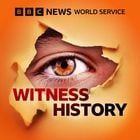
Witness History
Jan 22, 2024
In December 1939, fascist Norwegian politician Vidkun Quisling travelled to Berlin from Oslo for a secret meeting with Adolf Hitler.
Quisling suggested to Hitler that the British were planning to move into Norway for their own strategic needs. Norway hadn’t been a concern for the Nazis but the meeting alarmed Hitler and within months Germany started its invasion of Norway.
From that moment, Quisling was consigned into history as a traitor. So much so that in the time since, his name has become a byword for traitor in numerous languages.
Matt Pintus hears from Norwegian journalist, Trude Lorentzen, who decided to study Quisling’s life after stumbling across his suitcase in an online auction.
As part of her voyage of discovery, Trude interviewed Quisling’s Jewish neighbour Leif Grusd who was forced to flee to Sweden when the Nazis took over Norway.
Leif Grusd's interview was translated from the NRK podcast "Quislings koffert" - Quisling's suitcase - released in 2021. It was made by production company Svarttrost for NRK.
(Photo: Vidkun Quisling and Adolf Hitler. Credit: Getty Images)

